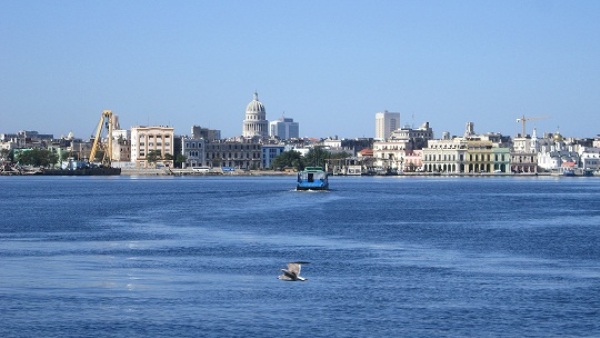INVERSIONES EXTRANJERAS EN CUBA: Preguntas sin Respuestas.
Las nuevas regulaciones reflejan el enfrentamiento abierto y brutal entre los moderados renovadores y las posiciones más recalcitrantes del régimen. Y despiertan un montón de interrogantes.
En un artículo en Juventud Rebelde se dice textualmente, “la nueva Ley de la Inversión Extranjera no será una varita mágica. Y si lo fuera, más de un enemigo preferirá perder un ojo, un brazo, y hasta dos, por tal de romper el hechizo, o denigrarlo”.
Es cierto. Subsisten numerosos problemas que tendrán que ser resueltos, porque una economía pequeña, aislada e ineficiente no puede obligar a los inversores extranjeros a que acepten, por imposición, un marco que es ajeno a la realidad de los movimientos de capital en el siglo XXI.
Lo cierto es que esta nueva Ley puede quedar en papel mojado antes de ver la luz porque las contradicciones se acumulan y plantean no pocos problemas de compleja solución dentro del entramado institucional del régimen castrista. Veamos algunas de estas cuestiones sin respuesta.
¿A qué precio se van a pagar los activos objeto de las inversiones? ¿Cómo se determina el valor de mercado de dichas adquisiciones cuando no existe un mecanismo institucional que permita realizar esa valoración en la economía castrista?
Y por la misma cuestión que antes, ¿a qué precio se van a pagar las eventuales ventas de las participaciones de los inversores extranjeros? ¿Quién comprará, y en qué condiciones, una desinversión?
¿Es suficiente el plazo de 8 años para la exención de los impuestos sobre los beneficios? ¿Por qué 8 años, y no 10 o 15? ¿Qué ocurrirá cuando los inversores extranjeros, por la razón que se trate, decidan marcharse antes de ese plazo? ¿Tendrán entonces que reintegrar los beneficios obtenidos o pagar algún tipo impositivo? ¿Cómo se resuelven estas cuestiones?
¿Qué sentido tiene que los beneficios de determinadas actividades como la explotación de recursos naturales, renovables o no, puedan recibir impuestos sobre utilidades, por decisión del Consejo de Ministros, con lo que ello supone de discrecionalidad? ¿Por qué unos sí, y otros no? ¿Qué lleva a que los foráneos queden exentos del gravoso impuesto sobre los ingresos personales y en cambio, a los inversionistas nacionales (que siempre serán personas jurídicas, dentro de lo que se incluye a las cooperativas —al parecer tanto agropecuarias como no agropecuarias) se les puede aplicar un tipo impositivo del 15% sobre la utilidad neta imponible? ¿Por qué esas diferencias entre extranjeros y nacionales?
¿Saben los inversores extranjeros que para sus proyectos en la Isla se deberá cumplir la legislación laboral y de seguridad social vigente en el país, con todo lo que ello supone? Si la empresa extranjera no encuentra personal cualificado en la agencia estatal autorizada por el Ministerio de Comercio Exterior (MINCEX), ¿cómo podrá reclutar los trabajadores que necesita para hacer viable su proyecto? Los trabajadores extranjeros que presten sus servicios en las empresas internacionales, ¿bajo qué legislación estarán contratados, la cubana o del país de procedencia?
Los pagos a los trabajadores se deberán realizar en moneda nacional, es decir, CUP. ¿Saben los inversores extranjeros el problema que supone en Cuba la búsqueda de moneda nacional, escasa y hasta cierto punto, limitada ante la eventual unificación que planean las autoridades sin fecha fija?
¿Por qué las inversiones extranjeras pueden ser autorizadas en todos los sectores, excepto en los servicios de salud y educación a la población y todas las instituciones armadas, salvo en sus sistemas empresariales? ¿A qué factores obedece este principio de reserva?
¿Saben los inversores extranjeros que solo podrán realizar sus proyectos en Cuba bajo fórmulas jurídicas preestablecidas por el régimen, es decir, empresa mixta, contrato de asociación económica internacional o empresa de capital totalmente extranjero, a lo que se añaden los “contratos de asociación económica internacional”? Fuera de esas modalidades, no es posible otro marco de relación, por ejemplo, las franquicias.
¿Son conscientes los inversores extranjeros en Cuba la plena protección y seguridad jurídica que se les pretende ofrecer es puro papel mojado? Es cierto que se afirma que las inversiones no podrán ser expropiadas, para añadir “salvo motivos de utilidad pública o interés social previamente declarados por el Consejo de Ministros”.
¿Están los inversores en condiciones de aceptar esa discrecionalidad del régimen castrista en los mecanismos expropiatorios? Ni siquiera justificar la práctica confiscatoria en concordancia con la Constitución y los tratados internacionales suscritos al respecto por el país, otorga garantías suficientes, teniendo en cuenta el modo en que el régimen castrista cumple los tratados internacionales que suscribe, por ejemplo, en materia de derechos humanos.
En cuanto a la indemnización, “establecida por mutuo acuerdo, pagadera en moneda libremente convertible, y con un árbitro que satisfaga a ambas partes”, conviene recordar que los expropiados de los años 60 y sus herederos continúan esperando el pago de sus propiedades.
¿Saben los inversores extranjeros que sus proyectos van a ser escrutados y calibrados al más mínimo detalle por burócratas de los distintos departamentos ministeriales? Así por ejemplo, el MINCEX someterá las propuestas de inversión que reciba al Ministerio de Ciencia, Tecnología y Medio Ambiente (CITMA), que evaluará su conveniencia desde el punto de vista ambiental, la protección de la propiedad intelectual y las decisiones respectivas. ¿Son conscientes de los retrasos y tropiezos que este tipo de evaluaciones pueden acarrear sobre proyectos que, en ocasiones, buscan la oportunidad de la rapidez?
La conclusión que cabe extraer de lo expuesto es que el éxito de este programa de captación de inversiones extranjeras no va a dar muchos motivos de felicidad y puede acabar siendo un frente de conflicto en el régimen castrista, donde es evidente que existen posiciones muy enfrentadas respecto a la apertura de la economía al exterior.
Basta con echar un somero vistazo a las disposiciones para descubrir, una vez más, que esta nueva regulación de los movimientos de capital refleja el enfrentamiento abierto y brutal entre los moderados renovadores y las posiciones más recalcitrantes del régimen. No se van a encontrar jamás en un texto como este, que no es más que paños calientes para paliar una grave situación que se vislumbra ante la eventual pérdida de los apoyos de Venezuela.
El fracaso está anunciado.
Agencies/DDC/ELÍAS AMOR, Spain/InternetPHotos/www.thecubanhistory.com
INVERSIONES EXTRANJERAS EN CUBA: Preguntas sin Respuestas.
The CUban History, Hollywood.
Arnoldo Varona, Editor
Puesta de sol en Cuba.
FOTO por Barbara Vanvanera, Marilu Lagunes.

FOREIGN INVESTMENT IN CUBA : Questions without Answers.
The new regulations reflect the open and brutal clash of positions between moderates and renovators recalcitrant inside the cuban regime. And brings a lot of questions.
In an article in Juventud Rebelde said verbatim , ” the new Law on Foreign Investment is not a magic wand. And if it was, more than one enemy will prefer to lose an eye , an arm, and even two , for that to break the spell, or denigrate . ”
It is true . There are still many problems that need to be resolved , because a small , isolated and inefficient economy can not force foreign investors to accept , by imposing a framework that is alien to the reality of capital movements in the XXI century.
The truth is that this new law can remain dead letter before seeing the light because the contradictions accumulate and pose many problems of complex solution within the institutional structure of the Castro regime. Consider some of these questions unanswered.
At what price ? Will pay assets object of investments ? How is the market value of such acquisitions determines when there is no institutional mechanism to make that assessment in the Castro economy?
And the same question as before, at what price they will pay any sales of shares to foreign investors ? Who will buy and under what conditions, a divestiture ?
Is this enough ? Within 8 years for the exemption of the tax benefits? Why 8 years, and not 10 or 15 ? What will happen when foreign investors , for the reason that question, decide to leave before that time ? Will then repay the benefits or pay a tax rate ? How are these issues resolved?
What sense is that the benefits of certain activities such as the exploitation of natural resources , renewable or not, can receive tax profits, the decision of the Council of Ministers , with all that this implies of discretion ? Why some yes and others not? What drives that are exempt from the onerous foreign tax on personal income and instead to domestic investors (which will always be legal persons, within what is included cooperatives – apparently both agricultural and non- agricultural ) is you can then apply a tax rate of 15 % on net taxable income ? Why these differences between foreign and domestic ?
Know ? Foreign investors for their projects on the island should enforce labor and social security legislation in the country , with all that entails ? If the foreign company is not qualified staff authorized by the Ministry of Foreign Trade ( MINCEX ) state agency , how can recruit workers who need to make the project feasible ? Foreign workers who provide services to international companies , under what legislation will be hired , Cuban or country of origin ?
Payments to workers should be made in local currency, ie CUP . You know the foreign investors in Cuba problem of finding national, and to some extent low currency, limited to the eventual unification planning authorities no fixed date ?
Why foreign investments may be authorized in all sectors except health care and education to the public and all armed , except institutions in their business systems ? What factors obey this principle of reservation?
Know ? Foreign investors are only allowed to your projects in Cuba under legal formulas preset by the system , ie , joint venture, international economic association contract or totally foreign capital company , what is added the ” international economic association contracts “? Out of these modalities is not possible under other relationship, eg franchising.
Are you aware ? Foreign investors in Cuba full protection and legal security that are intended to offer is pure wet paper ? It is true that states that investments shall not be expropriated , to add “unless reasons of public utility or social interest previously held by the Council of Ministers .”
? Investors are able to accept the discretion of the Castro regime in the expropriation mechanisms? Even justify confiscatory practice in accordance with the Constitution and international treaties signed by the country in this regard , given sufficient guarantees , considering how the Castro regime complies with international treaties undersigned, eg on rights human .
As for compensation, “established by mutual agreement , payable in freely convertible currency, and a referee that will satisfy both sides,” we should remember that the expropriated 60s and their heirs are still waiting for the payment of their properties.
Know ? Foreign investors that their projects will be screened and calibrated to detail by bureaucrats from different ministries ? For example, the MINCEX submit investment proposals received the Ministry of Science , Technology and Environment (CITMA ) , who will assess your convenience from the environmental point of view , the protection of intellectual property and the respective decisions . Are you aware of delays and setbacks that such assessments can lead on projects , sometimes look for opportunities to speed ?
The conclusion to be drawn from this is that the success of this program of attracting foreign investment will not give much cause for happiness and may end up being a front for conflict in the Castro regime , where it is clear that there are very conflicting positions on opening the economy to foreign .
Just take a cursory look at the rules to find out , once again, that this new regulation of capital movements reflects the open and brutal clash between moderates and renovators recalcitrant regime positions. They will not ever be found in a text like this , which is nothing more than hot packs to alleviate a serious situation that looms before the eventual loss of support from Venezuela .
The failure is announced .
Agencies/DDC / LOVE ELIAS , Spain / InternetPHotos / www.thecubanhistory.com
FOREIGN INVESTMENT IN CUBA : Questions without Answers .
The Cuban History , Hollywood.
Arnoldo Varona , Editor





